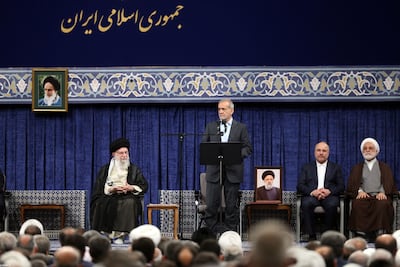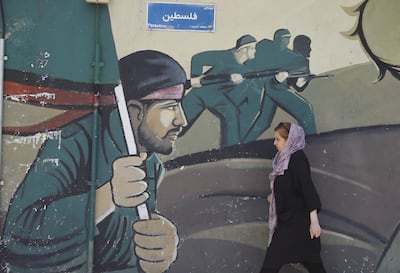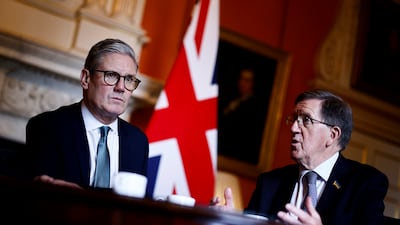One of the looming issues for the new UK government is how to deal with demands to put Iran’s Islamic Revolutionary Guard Corps on the country’s terror list.
By backing proscription, rather than merely subjecting it to sanctions, advocates see a means to prevent the group from attacking its rivals and opponents in the UK. A hugely implacable section of the legal and diplomatic establishment has always argued against this idea. The proposal has been blocked on the basis that the IRGC is an instrument of a foreign state, and terror laws are designed for non-state political violence.
Be that as it may, the UK has a problem with Iranian-directed political violence – as do many states in Europe and elsewhere. London has seen people working for the opposition-backed Iran International TV news channel threatened and savagely attacked. It has also seen religious centres controlled by Iran used as places of violence where ordinary members have been attacked.
The governing Labour party would, therefore, like to show that it is taking a new broom to these issues. Shortly before entering government, its home and foreign affairs spokespeople promised that it would move swiftly on proscription. The need is well-proven, but the potential fallout is highly contentious.
Iran is set to inaugurate a new president this week. In a pattern the world has seen before, the country has chosen someone outside the mould of its usual power structure. The label “reformist” is inevitably attached to the incoming presidency of Masoud Pezeshkian.

How far Tehran will deviate from the script laid down by the country’s supreme leader, Ayatollah Ali Khamenei, is also argued over in these early days. The likelihood of the Iranian government turning away from the overseas networks it operates is vanishingly small.
Jonathan Hall, the UK government’s top adviser on terrorism and foreign interference laws, is one of those opposed to proscription. He would not be afraid to say “I told you so” if the move was made and then backfired.
Discussing the country’s new foreign interference national security framework last week, he indicated that parts of those laws could apply to IRGC-style activity in the UK. The new crimes of foreign interference make an explicit offence not only of those activities directed, as Mr Hall puts it, by the foreign hand but also those done to benefit the other nation.
In his language, Mr Hall is evocative of the foundational spy novel, The Riddle of the Sands, published more than a century ago. He, like the author then, is trying to make sense of it all.

How big and important is the vista opened by the UK’s changing legislation? Are the boundaries to be drawn against the activity of foreign influence building short of interference? And what of the responsibility of the social media giants running platforms exploited by foreign interference operations?
With his counter-terrorism experience, Mr Hall knows that the internet is by far the biggest recruiting tool and accelerant of extremism. Surely one aspect of this new effort to target foreign interference should be a much more significant effort to make social media’s five top platforms more accountable for how their systems are exploited by state activity.
As he pointed out last week when he spoke to the London-based think tank Rusi, the new law targets much more subtle acts than sabotage, assassination, intrusion on military bases or theft of state secrets. When Mr Hall looked at the testimony released by the FBI when it uncovered the assassination plot against former US national security adviser John Bolton, he was able to point out that the proscription of the IRGC would have done little in this instance.
The often-mundane reality is that Iranians in charge of this work are based in Tehran and are trying to pull off spectacular coups without much in the way of resources. In Mr Bolton’s case, the handler was trying to chisel the would-be American killers into doing the job without making the promised payments from a ministry office in Iran.
The US protects its homeland much more thoroughly than the UK maintains its border controls, so the threat on this side of the Atlantic is far greater. There is little doubt that there are directed Iranian agents in the UK, as there are in Germany where the domestic intelligence service issues annual reports that track the network’s rise.
With powers in the UK beefed up to track suspect behaviour as doing harm on behalf of foreign powers, there is a case to be made that the previously neglected activities by the IRGC, or its Lebanese and other proxies, in the UK can now be dealt with.
But this is an emerging area of law enforcement. Mr Hall’s remarks made clear that it was anything but clear how those powers will be used. As he acknowledged, there is no readily recognised threshold for these activities. Without the terrorism designation, the IRGC benefitted from the lack of policy focus. Quickly defining a threshold in this area for the national security provisions could help make up that gap.
There is another reason to wonder if any of this can happen.
Amid speculations around attempts between Tehran and London for a renewed bout of diplomacy, proscribing the IRGC would kill any hopes for meaningful talks. And it there were exploratory discussions, it is a fair bet that finding and thwarting the Iranian hand in abuses and conspiracies in the UK would also drop off the agenda.
That said, there is room for more robust action by the authorities under the new legal powers – should those at the highest levels care to take a look.


